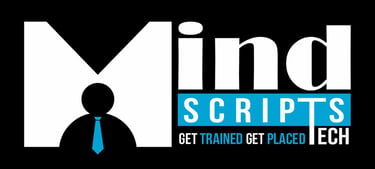Kickstart Your IT Career with MindScripts Tech! 🚀 Expert-Led Training | 3 Days Free Demo | 100% Placement Assistance | Join 1500+ Company Tie-Ups Today! Ready to Succeed? Let’s Begin!
Breaking into the Software Testing Industry: Essential Skills and Qualifications
In the dynamic landscape of technology, software testing stands as a crucial pillar in ensuring the reliability, functionality, and quality of software applications.
MindScripts Tech
3/28/20243 min read


In the dynamic landscape of technology, software testing stands as a crucial pillar ensuring the reliability, functionality, and quality of software applications. With the exponential growth of the software industry, the demand for skilled software testers has surged, making it an attractive career path for aspiring professionals. However, breaking into the software testing industry requires more than just a passion for technology; it demands a blend of essential skills, qualifications, and a strategic approach. In this blog, we'll explore the key aspects aspiring testers need to consider to embark on a successful career journey in software testing.
Understanding the Role of a Software Tester
Before delving into the skills and qualifications required, it's essential to grasp the role of a software tester. Software testers play a pivotal role in ensuring that software applications meet the specified requirements, perform seamlessly, and are free from defects or bugs. They are responsible for designing test cases, executing tests, identifying and reporting defects, and collaborating with developers and stakeholders to ensure the software's quality and reliability.
Essential Skills for Aspiring Software Testers
1. Analytical Skills: Software testing involves analyzing complex systems, understanding requirements, and identifying potential areas of failure. Strong analytical skills are essential for dissecting software functionalities and designing effective test strategies.
2. Attention to Detail: Testers must possess a keen eye for detail to uncover even the smallest discrepancies or anomalies in software behavior. Meticulous attention to detail ensures thorough testing and helps maintain the integrity of the software.
3. Problem-Solving Abilities: Software testing often involves encountering unexpected issues or challenges. Testers need to be adept at troubleshooting problems, thinking critically, and devising innovative solutions to ensure the smooth functioning of software applications.
4. Technical Proficiency: While a deep understanding of programming languages may not always be necessary, a basic understanding of programming concepts and proficiency in utilizing testing tools and frameworks are valuable assets for software testers.
5. Communication Skills: Effective communication is paramount for testers to convey their findings, collaborate with cross-functional teams, and articulate complex technical concepts in a clear and concise manner. Strong communication skills foster collaboration and facilitate the resolution of issues efficiently.
6. Adaptability and Learning Agility: The software industry is constantly evolving, with new technologies, methodologies, and tools emerging rapidly. Testers must exhibit adaptability and a willingness to embrace continuous learning to stay abreast of industry trends and advancements.
Qualifications and Certifications:
While formal education is not always a prerequisite for entering the software testing field, obtaining relevant qualifications and certifications can enhance credibility and marketability. Some certifications that aspiring software testers may consider include:
- ISTQB (International Software Testing Qualifications Board) Certification: Offers a comprehensive curriculum covering essential testing principles, techniques, and best practices.
- Certified Agile Tester (CAT): Focuses on testing within an agile development environment, emphasizing collaboration, adaptability, and continuous improvement.
- Certified Software Test Professional (CSTP): Provides a structured program covering various aspects of software testing, including test planning, execution, and automation.
In addition to certifications, pursuing a degree or coursework in computer science, information technology, or a related field can provide foundational knowledge and a deeper understanding of software development and testing principles.
Conclusion
Breaking into the software testing industry requires a combination of essential skills, qualifications, and a proactive approach to career development. By honing analytical, problem-solving, and communication skills, as well as pursuing relevant certifications and qualifications, aspiring software testers can position themselves for success in this dynamic and rewarding field. With dedication, continuous learning, and a passion for quality assurance, aspiring testers can embark on a fulfilling career journey contributing to the advancement of software technology.
Ready to kickstart your career in software testing?
Explore our comprehensive Software Testing Course, designed to equip you with the essential skills and knowledge needed to excel in the field.
Enroll now to take the first step towards a rewarding career in software testing!



At MindScripts Tech, our mission is to empower individuals through cutting-edge IT education, bridging theory with practical skills. We cultivate innovation, nurture creativity, and prepare our students to thrive in the dynamic IT industry, fostering a globally competitive workforce.
